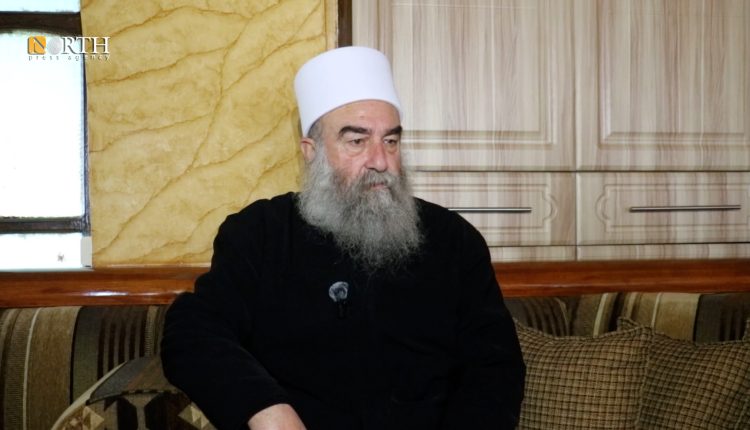Syria’s Druze Leader Condemns Jaramana Violence, Urges Calm Amid Sectarian Tensions
By Kardo Roj
SUWAYDA, Syria (North Press) – Sheikh Hikmat al-Hijri, the spiritual head of Syria’s Druze community, issued a strongly worded statement Tuesday evening denouncing the recent outbreak of violence in Jaramana, a suburb of Damascus, and called for restraint amid growing sectarian tensions.
The statement follows deadly clashes in the early hours of Tuesday that left five civilians dead and at least 12 others wounded, including several public security personnel. The violence erupted after a local Druze youth reportedly made offensive remarks about the Prophet Muhammad, triggering a wave of unrest and retaliation.
In his address, Sheikh al-Hijri condemned the attacks as “heinous terrorist assaults against innocent people without justification,” warning that the intent behind such violence is to “sow division, ignite sectarian strife, and spread bloodshed and chaos.”
The senior cleric emphasized that such incidents must not be allowed to fragment the nation’s social fabric or be used as a pretext for incitement. “We warn all parties—regardless of identity or affiliation—against insults to religions or sacred beliefs,” al-Hijri stated. “The fire of sectarian strife, once lit, will consume everyone.”
Expressing concern over the deteriorating public discourse, he criticized the trend of mutual accusations and ideological takfir. “It is regrettable that people have turned against one another, leveling charges and inciting divisions, while those demanding justice are vilified or silenced,” he added.
Criticism of Syria’s Transitional Government
In a rare and pointed rebuke of Syria’s new transitional government, Sheikh al-Hijri questioned its legitimacy and performance, stating that “no tangible progress has been made since the so-called victory was declared.”
“There has been no genuine national dialogue, no inclusive constitutional drafting process, and nothing built upon fair or sound principles,” he remarked. “What remains is a continuation of old exclusionary practices, now repackaged with deeper sectarian dimensions.”
Al-Hijri warned against the persistence of one-party dominance and the exploitation of religious identity in political maneuvering, urging a return to governance rooted in citizenship and law.
Calls for Transitional Justice, Not Revenge
The Druze spiritual leader also highlighted the importance of transitional justice based on fairness rather than reprisal. “Justice must not be reduced to vengeance. It must include equitable representation and responsibility-sharing across society,” he said.
He reiterated the need to hold all perpetrators—past and present—accountable for crimes, including those behind the mass violence and incitement that continue to destabilize various parts of the country.
Local Dialogue Initiatives Underway
In parallel with the statement, community leaders in Suwayda convened an urgent meeting aimed at calming tensions and preventing the spread of unrest from Jaramana to other parts of the country. Sources present at the meeting told North Press that participants agreed to promote de-escalation and emphasized the importance of dialogue, unity, and mutual respect among Syria’s diverse communities.
The meeting, which brought together civil actors, tribal elders, and local officials, highlighted the risks of further sectarian polarization and affirmed a collective commitment to non-violence and national cohesion.
A Turning Point for Syria’s Social Fabric?
The events in Jaramana and their aftermath underscore the fragility of Syria’s sectarian balance at a time of deep political uncertainty. While the conflict’s frontlines have quieted in many regions, unresolved grievances and distrust continue to simmer beneath the surface.
In northeastern Syria, areas governed by the Autonomous Administration of North and East Syria (AANES) have invested in inclusive governance and religious tolerance, contrasting with rising intercommunal tensions elsewhere in the country. The challenges in Jaramana may further highlight the importance of such models of coexistence and stability.
As Syria’s complex transition unfolds, the leadership of respected community figures like Sheikh Hikmat al-Hijri could prove critical in steering the country away from further division and toward a shared future rooted in justice and mutual respect.

